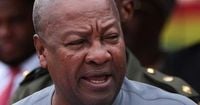On September 10, 2025, a commercial flight touched down in Accra, Ghana, carrying an unusual group of passengers: fourteen West African nationals deported from the United States. The arrival marked Ghana’s entry into a growing list of African countries agreeing to accept migrants expelled by the US under President Donald Trump’s controversial immigration crackdown—a policy that has stirred legal, diplomatic, and humanitarian debates on both sides of the Atlantic.
Ghanaian President John Mahama confirmed to reporters that the group included several Nigerians and a Gambian national, all of whom had been living in the US before their deportation. According to Mahama, Ghana’s decision to accept these individuals was rooted in the Economic Community of West African States (ECOWAS) protocol, which allows for visa-free travel and residence among member states for up to 90 days. “We agreed with (Washington) that West African nationals were acceptable because all our fellow West African nationals don’t need a visa to come to our country,” Mahama explained, as reported by BBC News and France 24.
This agreement, however, is more than a simple application of regional travel rules. Ghana’s move comes at a time when the Trump administration has been ramping up pressure on African nations to accept deportees—not just their own citizens, but also third-country nationals who happen to be from the West African region. In July, President Trump hosted leaders from Senegal, Mauritania, Guinea-Bissau, Liberia, and Gabon at the White House to discuss the possibility of accepting such deportees. Ghana is the first West African country to publicly announce an agreement of this kind with the US, according to Associated Press.
Since January, Trump’s second term has been marked by an aggressive push to reduce undocumented migration. His administration has sought deals with multiple African countries, including Rwanda, Eswatini, South Sudan, and Uganda, to accept individuals expelled from the US—sometimes to countries they have never lived in. The US government claims that many of these deportees are dangerous criminals, but civil rights groups and lawyers have raised red flags about the legality and morality of the practice.
“The US is mounting considerable pressure on African countries to accept Venezuelans to be deported from the US, some straight out of prisons,” Nigerian Foreign Minister Yusuf Tuggar told Channels Television in July. “It will be difficult for Nigeria to accept Venezuelan prisoners,” he added, suggesting that recent US tariff threats were linked to the issue of deportations. Nigeria, which comprises the bulk of deported migrants to Ghana, has been vocal in its opposition, saying it would not bow to US demands to accept third-country migrants.
The arrival of the fourteen deportees in Ghana is part of a broader trend. In the preceding months, the US deported seven migrants to Rwanda, five to Eswatini, and eight to South Sudan. South Sudan, for its part, accepted eight individuals, most of whom were convicted of serious crimes such as murder, robbery, and sexual assault. According to Bloomberg, South Sudan is now seeking to transfer six of these deportees to their countries of origin, with government spokeswoman Apuk Ayuel Mayen stating, “Ideally, they were supposed to be released to their countries of origin.”
Ghana’s willingness to accept third-country deportees, however, is not without complications. The agreement has coincided with increased US tariffs on Ghanaian goods (a 15% hike) and visa restrictions on Ghanaian nationals. Mahama described the relationship as a “tightening situation,” but insisted that overall relations with Washington remain positive. “All our fellow West African nationals don’t need visas to come to our country,” he reiterated, emphasizing the legal foundation for the move.
For the deportees themselves, the journey has been fraught with uncertainty. Some, like the Nigerians in the group, were quickly facilitated to return home by bus, according to BBC News. The Gambian national was still being assisted to return home at the time of reporting. Yet, not all deportees have had such straightforward transitions. In Eswatini, five men deported in July were held in a maximum-security prison for seven weeks without charge or access to legal counsel, their lawyers told Associated Press. Rights groups have pointed out that many of the African countries agreeing to these deals have poor human rights records, with government critics often targeted.
Beyond West Africa, the Trump administration’s deportation strategy has reached new and sometimes alarming lengths. Hundreds of people have been sent to Panama and El Salvador, in some cases before their asylum applications could be processed. In El Salvador, many have ended up in the notorious Terrorism Confinement Center, or CECOT, prison. The administration has even invoked an 18th-century law to justify removing individuals it accused of being Venezuelan gang members, despite US judges ordering deportation planes to turn around in some cases, according to FRANCE 24.
Ghana’s decision has also played out against a backdrop of domestic tension. The country has long hosted Nigerian immigrants, but recent weeks have seen sporadic protests in several Ghanaian cities, with demonstrators blaming Nigerians for rising crime, prostitution, and economic competition. In late July, Nigeria sent a special envoy to Ghana, and both countries’ officials held talks aimed at calming the situation.
Legal and ethical questions continue to swirl around the US deportation policy. Lawyers and activists argue that sending migrants to unfamiliar countries—sometimes without due process or the chance to appeal—violates basic rights and international norms. “The practice will have a greater impact on law-abiding noncitizens who are at risk of being sent to unfamiliar places with little, if any, recourse,” civil rights groups told Bloomberg.
For now, Ghana stands as the first West African nation to openly accept third-country deportees from the US, citing regional agreements and diplomatic necessity. Whether this marks the beginning of a new era in US-Africa migration relations or simply a temporary measure under extraordinary pressure remains to be seen. What’s certain is that the lives of those deported—and the politics surrounding their return—will continue to reverberate across continents.





